career
Becoming a Tech Marketer
Written on 20 June 2021
In 2013, I went to the UK to study accounting and finance for my undergraduate degree. I chose accounting and finance because I thought it would be a helpful skill to have when I start my own business. In my first year, I wanted to an investment banker so that I can make a lot of money. Why not? But I often lie in bed thinking if that is what I want to do with my life.
Then someone asked me, "if you are paid to sharpen pencils for eight hours every day, will you be satisfied?" His advice is I should aim to learn as much as possible and not work just for money. (Of course, I was in a good position to not worry about my finances).
About a year later, I heard about a cool startup, Buffer. I wanted to join them so much that I applied three times. When I was rejected the second time, I asked for feedback. The hiring manager said she would love for me to improve my writing. So I did. While my friends were traveling in Europe during the spring break, I challenged myself to write 30 articles in 30 days. It paid off eventually because it moved the hiring manager and her manager. I was hired!
In 5.5 years, the company grew from about $5 million annual recurring revenue (ARR) to $20m ARR. I started in community management and customer support. Then I moved into content marketing and SEO where I got to grow the blog to 1.5 million monthly sessions in a team of two. In my last two years, I moved into product marketing. Together with the product team, we launched and grew a new product to more than $1 million ARR in about a year.
About a month ago, I joined ReferralCandy as a senior marketing manager to pursue the next step of my career. The team has three other marketers and four freelancers. It has been challenging and fun to think about not just marketing but also management and hiring.
Learning fundamental marketing skills
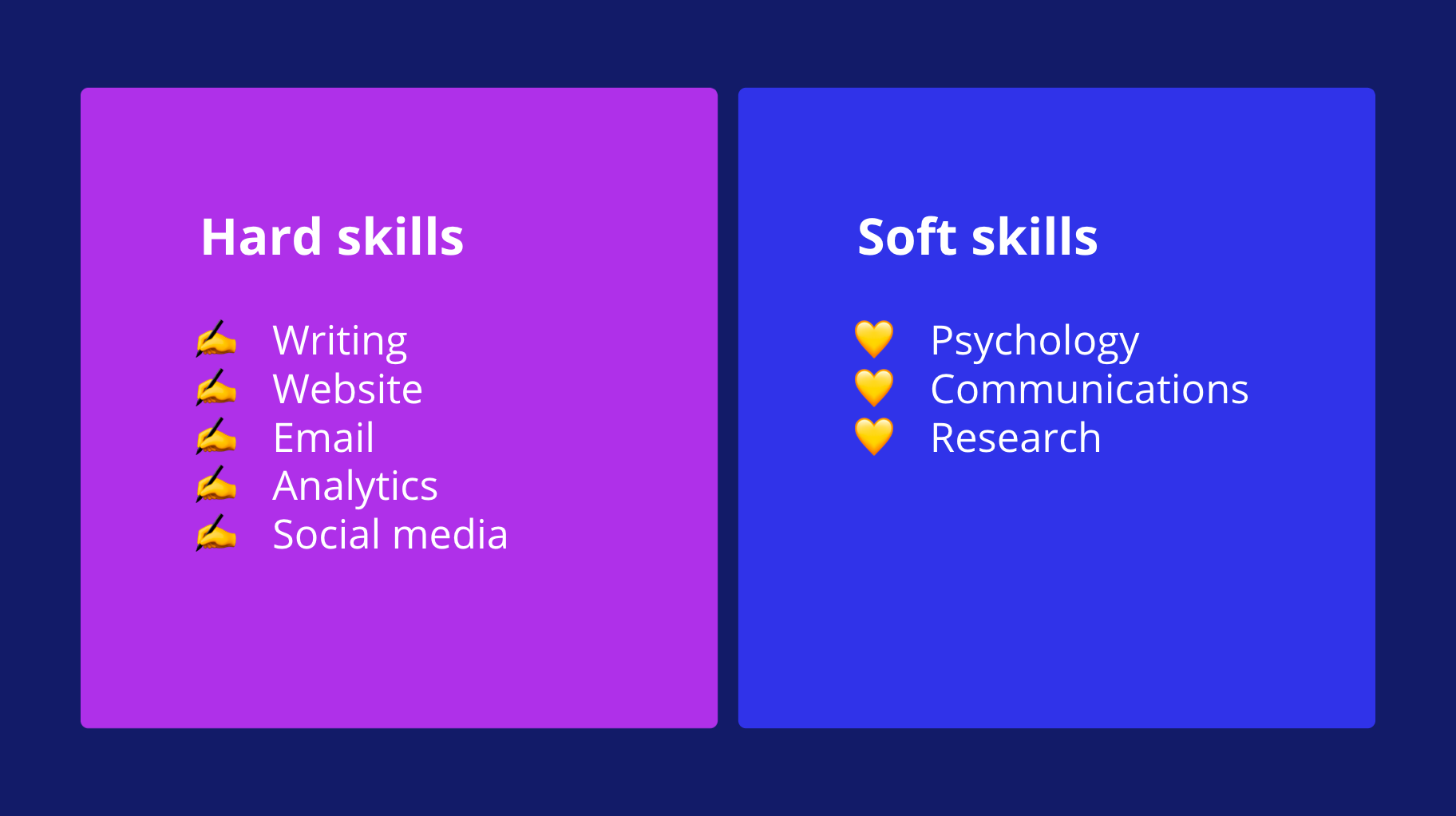
In my experience, having a blog and writing regularly is the best way to learn fundamental marketing skills.
You first have to set up a website, which will teach you about the various website platforms, hosting, and domains. Writing regularly will help you practice writing and research often. Once you start writing, you might be curious how many people are reading your blog and can learn to set up analytics and understand your data. Then to get more readers, you might want to share on social media or start collecting email addresses to send them your latest blog posts.
At the same time, you get to build your personal brand.
But trust me, it will be hard. Even after publishing regularly for eight years, I still struggle to write often. That is why many people do not do it. But it also means if you do, you can stand out more easily.
Getting interesting job opportunities
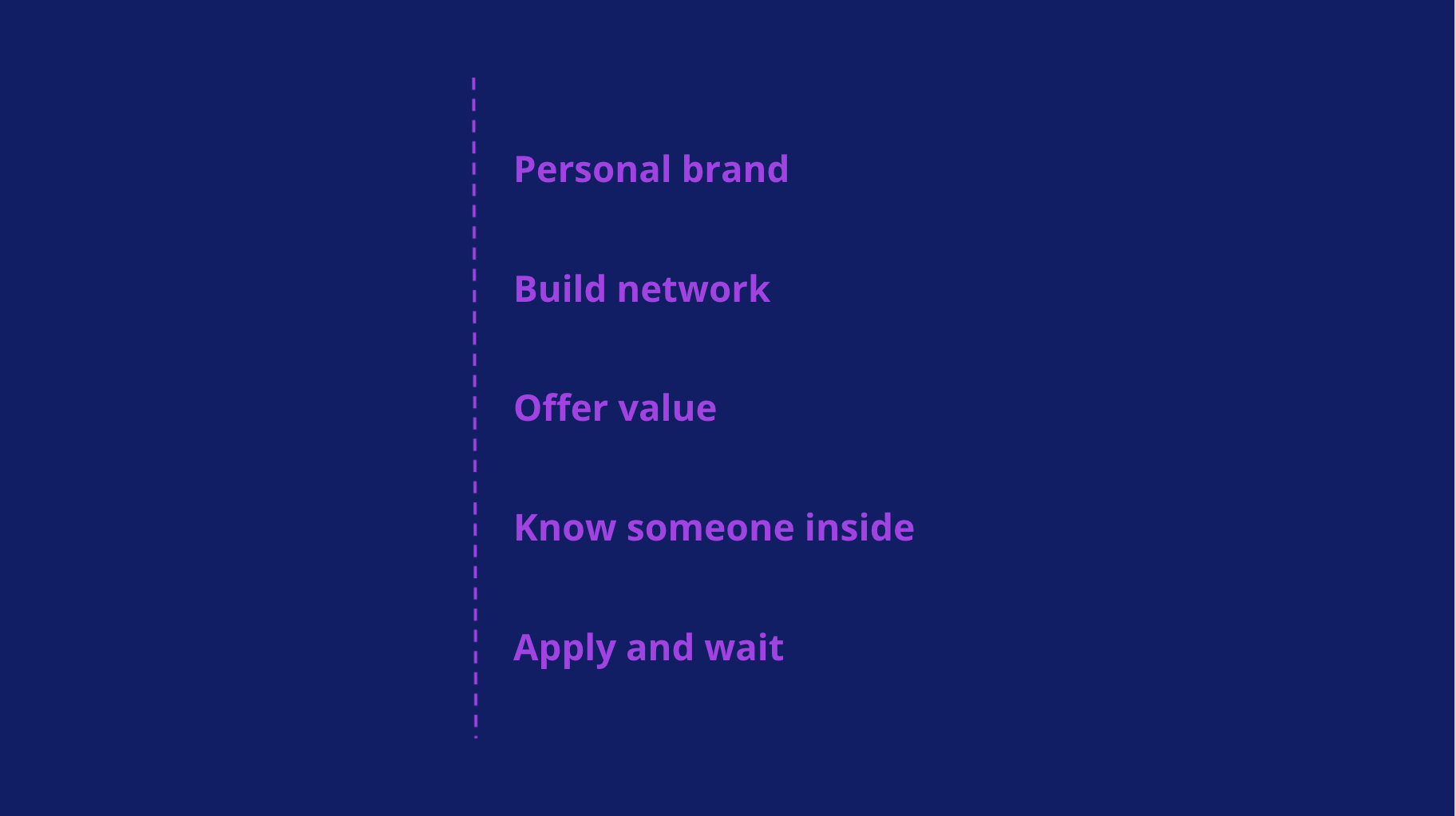
The last thing to do is to apply for a job on the company website and wait. At least that has never worked for me so far.
If you have been blogging and building your personal brand, you have already taken the first step. I would recommend being on Twitter if you want to work in tech. It is my window into the tech world from my room in Singapore. Twitter helped me get my first job at Buffer. LinkedIn seems to be getting more popular too. Anecdotally, I have been receiving many recruiting messages on LinkedIn, so I would also recommend having an up-to-date LinkedIn profile.
Build your personal brand and network takes time. Another thing to do is to offer value. In 2015, I reached out to the organizers of Leanconf to offer to help with their social media. They were busy with many things and were glad to get some help. They eventually also asked me to help to find speakers and sponsors. Before I got my job at Buffer, I was helping to facilitate conversations in the community and giving suggestions on how the online events could be improved.
The final "trick" is to know someone inside the company. For example, because I applied to Buffer three times, the hiring manager already knew me. I also knew a few other folks from Twitter, whom I think might have put in a good word for me. For my new ReferralCandy job, I was recommended to the CEO by a good friend, which allowed me to skip the entire application process.
Considering job offers and career changes
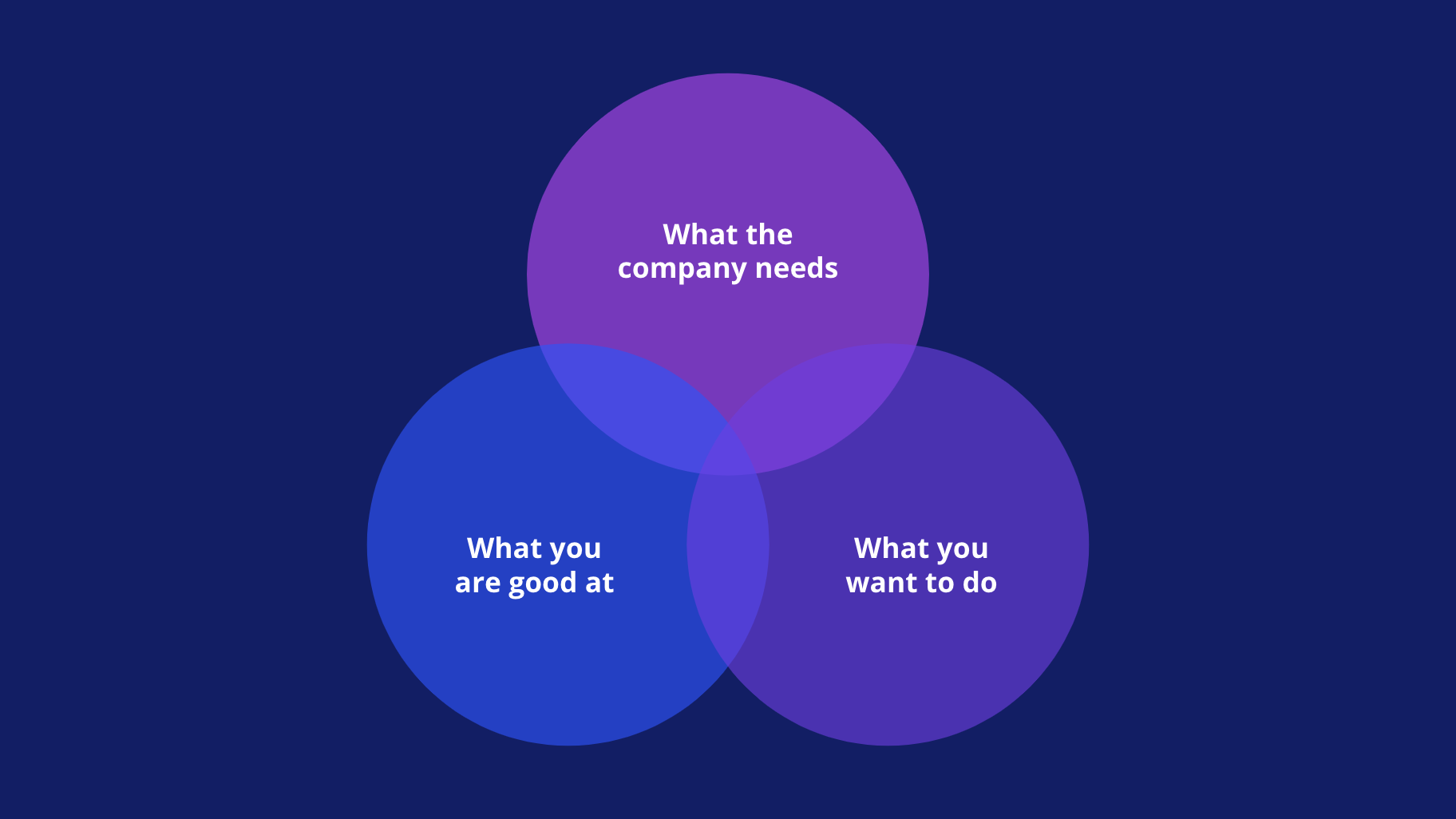
I use this Venn diagram to help me think through job offers and career changes. The sweet spot is in the middle, where what the company needs is what you like and are good at.
Most people tend to be at the intersection of what their company needs and what they are good at. That is why they were hired. But if the job is not what you want to do, you will feel miserable eventually. It'll be helpful to consider moving into other roles. For example, I got bored of content marketing at Buffer after two years. But fortunately, I had the opportunity and skills to move into product marketing.
The flip side is being at the intersection of what their company needs and what they want to do. But they are not good at it. If you are in this position, you want to get trained by the company or do it yourself. At Buffer, my manager helped me get better at writing and I also worked hard to practice writing and learned SEO from others.
Finally, you might be good at what you want to do but the company does not need that skill set. You probably want to find another company that needs your skill set.
In reality, it is not so clearcut but this framework has helped me over the years as I moved between roles.
Growing professionally
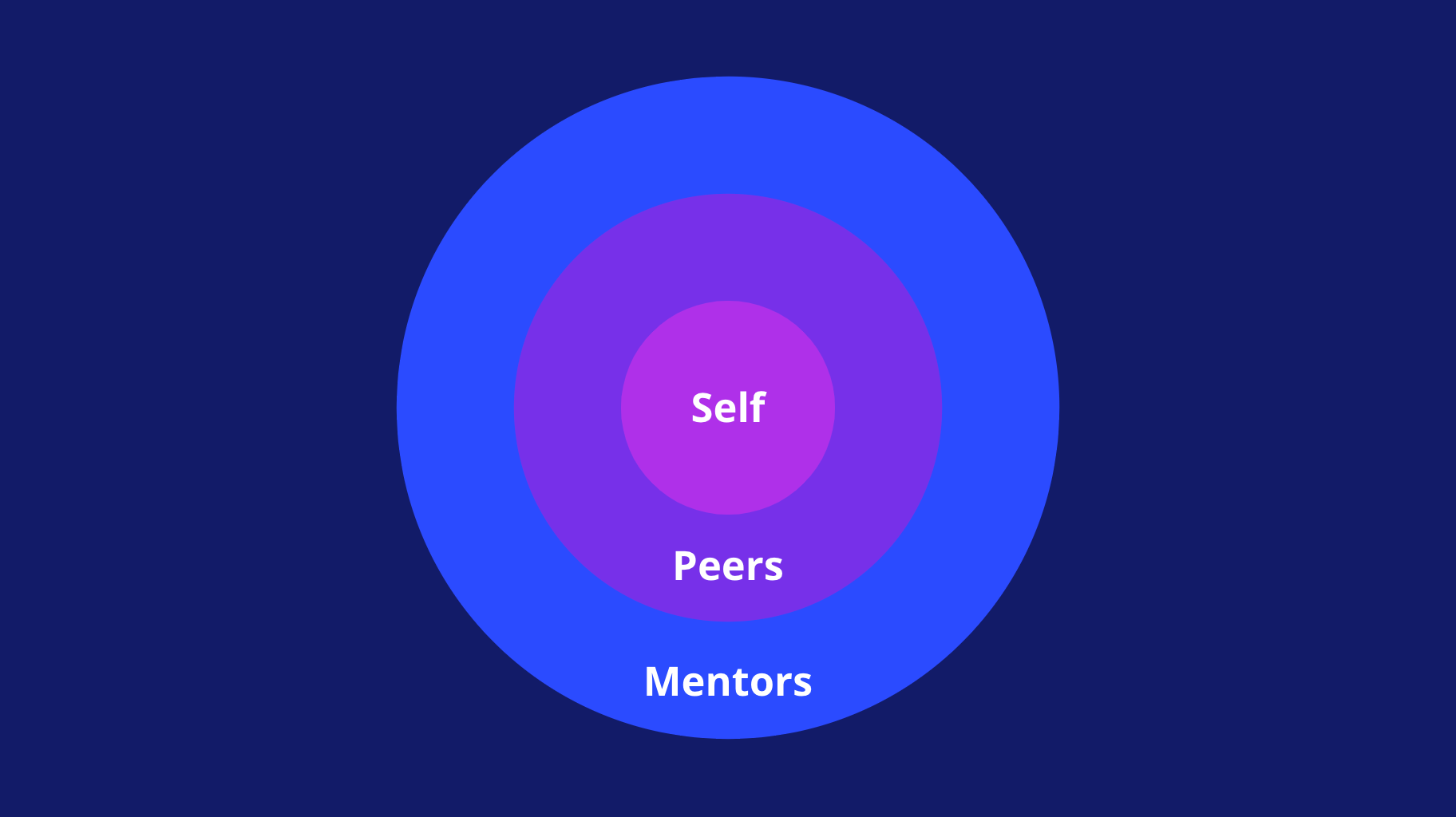
Many people will first think about getting mentors or being asked to attend training. But I think it should start with ourselves. We are responsible for our own development.
The thing that has helped me with my growth the most so far is writing. Every week, I publish a new essay and send a newsletter. Because of that, I’m always paying attention to interesting ideas to connect with ideas in my head. I also try to read a lot so that I can come up with new ideas or share them in my newsletter.
The next level is peers. I have been able to connect with a broad group of peers on Twitter and LinkedIn. I also like small, local Slack communities, which are better for getting to know others and learning from them. My personal favorite is having a few friends on "speed dial". I have a few friends whom I regularly message and meet to ask for advice or to bounce ideas.
The final level is mentors. Many people think about this first but it is the hardest to get right. You need the chemistry. The person has to enjoy interacting with you, you have to like them, and so on. A good place to start is your previous managers. My informal mentor is my previous manager. We worked together for about five years, so we know each other well. I would email him to ask for his advice on various things.
Hard work and luck
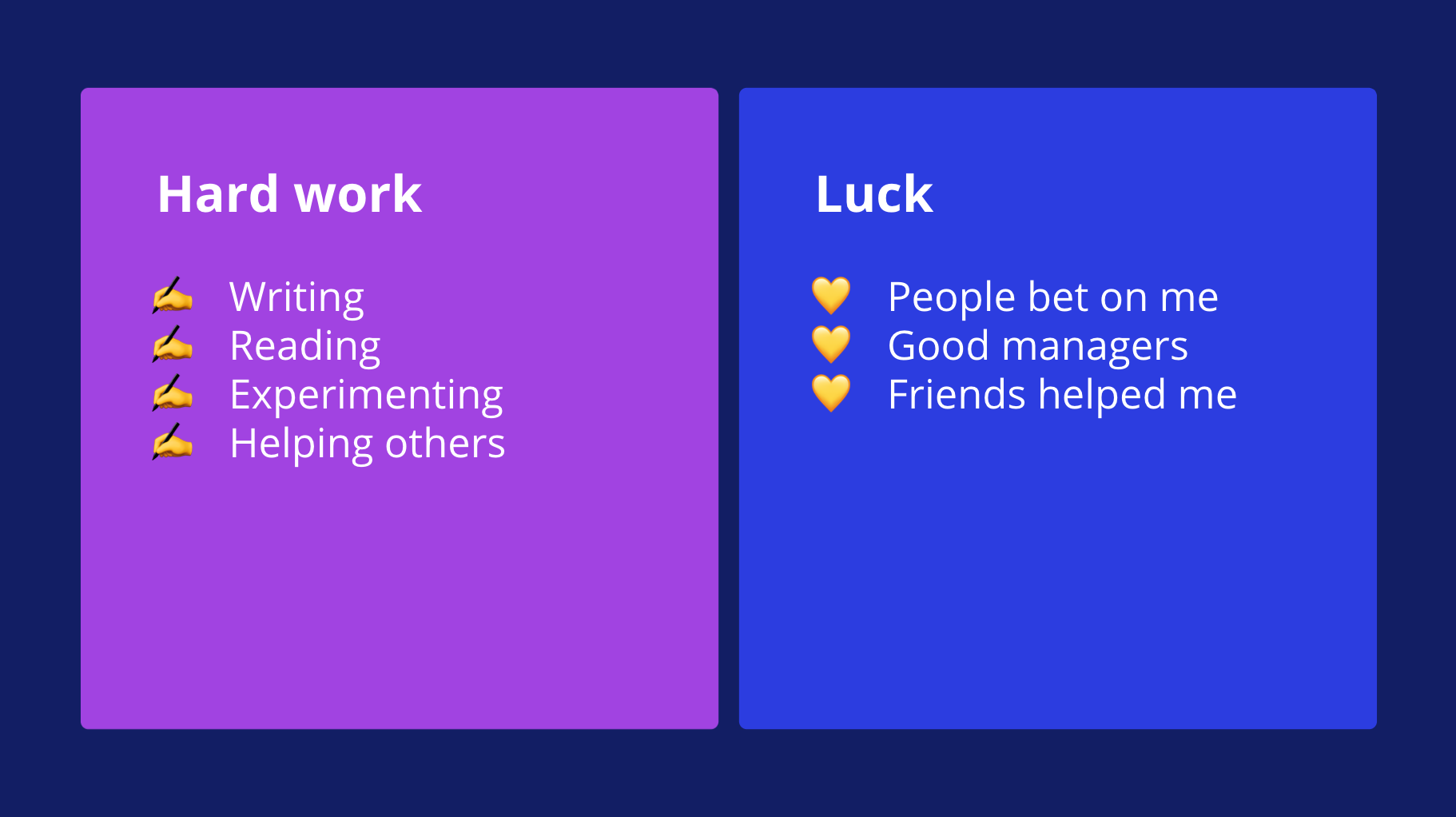
I work hard but without luck, I would not be where I am today. People bet on me, I had good managers, and my friends helped me.
But at the same time, if I did not work hard, I do not think luck would come and find me. Like Richard Hamming said, "luck favors the prepared mind."